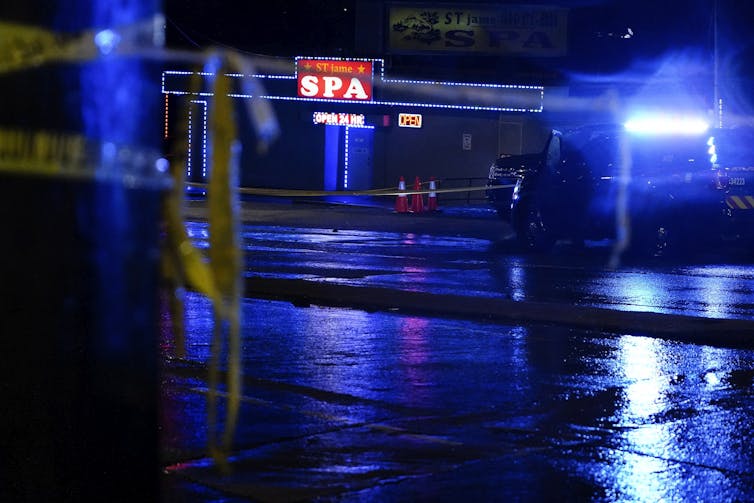
Vincent Wong, University of Windsor
In April 2022, the town of Newmarket in southern Ontario began a bylaw enforcement crackdown campaign to, in the words of Deputy Mayor Tom Vegh, “drive [sex work] out of town.”
The crackdown has resulted in disproportionate illegalization, surveillance, harassment, ticketing and displacement of many of Newmarket’s Asian-owned massage businesses and their workers.
What many people may not know, however, is how Newmarket’s crackdown is representative of a long history of racist bylaws and licensing regimes targeting Asian businesses that hearken back to an era of unapologetic Canadian white nationalism.
Contentious bylaw
The Newmarket crackdown relies on a contentious new licensing bylaw that requires all massage businesses without Registered Massage Therapist (RMT) designation to obtain a Personal Wellness Establishment (PWE) licence.
The majority of Asian migrant massage workers practise as foreign-trained or informally trained holistic health providers. As a result of the new regime, all existing non-RMT massage businesses were rendered illegal by the new bylaw and forced to go to the town to apply for a PWE licence or risk being shut down.
However, the new PWE licensing regime is unabashedly discriminatory. According to the grassroots community group Butterfly, all of the Asian massage businesses have been rejected or otherwise not approved for a licence.
The new bylaw sets out a vague requirement that applicants must successfully complete “training” from an “accredited educational institution” to the satisfaction of the licensing manager.
But despite repeated requests, the town has refused to define what training and which institutions would be accepted, insisting that determinations will be made on a “case-by-case” basis. That raises serious questions about the arbitrary nature of licence refusal.
Once criminalized, police posted yellow notices on the doors of Asian massage businesses demanding they shut down, issued harsh fines of $4,000 a day and subjected workers to undercover police solicitation while denying interpretation and translation services.
Warnings of repercussions
These racially discriminatory impacts are exactly as predicted.
During formal consultations for the PWE licensing regime in spring 2021, numerous directly affected Asian massage workers, community, racial justice and women’s rights organizations repeatedly raised concerns.
They flagged the regressive licensing exclusion, the impact of punitive bylaw enforcement on the safety and livelihoods of Asian massage workers in other municipalities and the racialized violence that could be inflicted on these workers due to stigma. They also point out the harmful conflation of massage work and sex work with human trafficking.

Nevertheless, Newmarket City Council dismissed these concerns entirely, often relying on racialized caricatures of Chinese massage workers as either corrupt villains or helpless victims.
One consultation witness even described Asian women in the massage industry as people “who [don’t] even speak enough English to consent to sex.” No one from the Newmarket City Council intervened or pushed back against this characterization.
Why do these racist tropes continue to carry so much weight, even in the face of direct political opposition from Asian migrant women themselves?
Part of the reason is that racism against Asian migrant women dates back to the very founding of exclusionary laws in Canada. The first immigration prohibition on the basis of race and/or gender was passed in 1885 and refused landing to “any Chinese woman who is known to be a prostitute.”
Chinese sex workers were seen as legitimate objects of policing and exclusion due to their supposedly corrupting and immoral influence, proclivity to disease and illness, and passivity and helplessness to subjugation — all narratives evident in Newmarket’s view of Asian massage workers today.
Shameful history of Asian business harassment
Newmarket’s abuse of bylaws and licensing repeats much of what municipalities did to Asian people in this country a century ago during the era of white nationalist exclusion.
Racist bylaws and licensing regimes were deployed from Vancouver to Lethbridge, Toronto, Ottawa and Québec City to control, harass and push out Asian businesses like Chinese laundries and restaurants.
It was common in that era for governments to introduce licensing regimes in sectors where large numbers of Asians worked to immediately render all businesses illegal and use permit issuance to racially filter legal and illegal establishments.
British Columbia implemented such discriminatory licensing regimes between 1881 up until the Second World War for laundries, logging businesses, pool halls, liquor stores and restaurants.
Bylaws were also mobilized to displace the presence of Asian businesses through zoning and location restrictions.
For instance, in 1911, in response to complaints by some white laundry proprietors that Chinese laundries were operating too close to the town centre, Lethbridge City Council enacted a bylaw restricting Chinese laundries to less commercially attractive areas that were out-of-sight for most residents.
Guard against repeating history
We must recall this history so as to not repeat it.
The town of Newmarket’s draconian and heavy-handed use of bylaws and licensing to target, intimidate and displace Asian massage workers risks taking us back to a racist past in Canadian history to a time when Asians were seen as moral threats to be run out of “reputable” society.
Now, as then, Asian migrant workers continue to resist and demand equal respect and dignity. In the words of the Newmarket massage workers:
“We are not dishonourable trash to be cleansed from the city. We are not expendable labourers who can be coerced into the back-breaking, low-paying jobs they think we deserve. We are not helpless trafficking victims in need of rescue. We are human beings who can choose our own path, make our own decisions, and support ourselves with dignity if they’ll only let us.”
Vincent Wong, Assistant Professor of Law, University of Windsor
This article is republished from The Conversation under a Creative Commons license. Read the original article.

